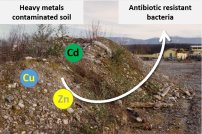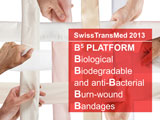Various research projects are currently pursued in the laboratory:
Resistance to carbapenem and zinc homeostasis:
Pseudomonas aeruginosa is an opportunistic pathogen that can cause severe infections. In the presence of metals such as Zn or Cu (found in excess in polluted environments or in certain pathological situations), P. aeruginosa becomes resistant to antibiotics of the carbapenem family. We are studying the molecular mechanisms linking the homeostasis of these metals and the carbapenem resistance mechanism.

Severe burns infections:
Pseudomonas aeruginosa is the major pathogen infecting wounds results of severe burns. In order to improve the antibacterial activity of the bandages used for the healing of burns, studies on the physiology and behavior of this pathogen have been initiated as part of a major translational research project (B5 platform).

Search for new antimicrobial compounds:
Our group is part of the SECIL (Study of Endophyte Communities In a Leaf), a consortium involved in the search for new antimicrobial molecules isolated from endophytic plant microorganisms. Within the frame of this study, new methods of screening to detect antimicrobial compounds against Staphylococcus aureus and Pseudomonas aeruginosa have been set up in the laboratory.
